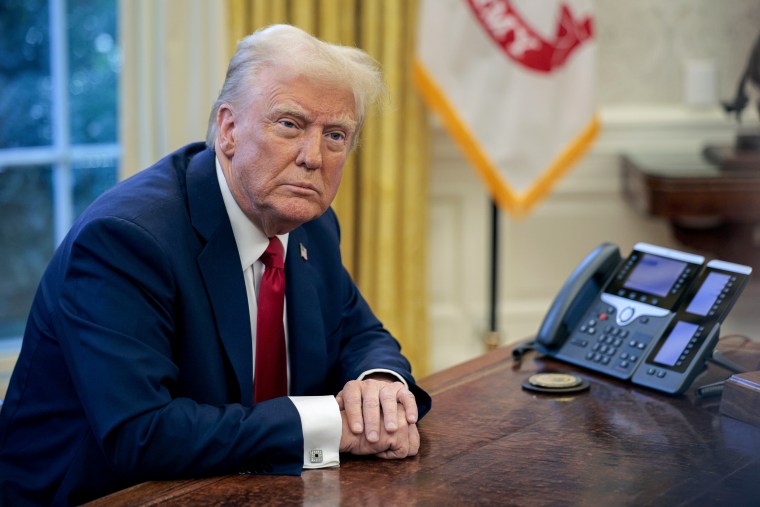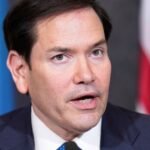Trump’s pardons highlight Justice Department’s pullback from public corruption cases
WASHINGTON — The government’s evidence against Scott Jenkins was compelling, including undercover video and other corroboration showing Jenkins, then the sheriff of Culpeper County, Virginia, accepting over $75,000 in exchange for giving law enforcement authority to local businessmen, as well as two undercover FBI special agents.
Jenkins’ co-defendants all pleaded guilty, and jurors didn’t take long to convict Jenkins last year, deliberating for around two hours before they found him guilty on all counts. When Jenkins was sentenced to 10 years in prison in March, the acting U.S. attorney for the Western District of Virginia said he “violated his oath of office and the faith the citizens of Culpeper County placed in him when he engaged in a cash-for-badges scheme.”
But on Monday, President Donald Trump announced he was pardoning Jenkins, calling him “a victim of an overzealous Biden Department of Justice” who “doesn’t deserve to spend a single day in jail.” It’s part of a broader pattern for Trump, who in the first few months of his second term has pardoned at least four supportive former public officials who were convicted of financial improprieties.
Trump, who faced two separate federal criminal cases that were dropped after he was re-elected in November, has long argued that he was a victim of the weaponization of the Justice Department and the FBI, and he has been sympathetic to those who make similar claims, particularly those who are politically aligned with him.
In February, Trump pardoned Rod Blagojevich, the Democratic former governor of Illinois, whose sentence he had commuted in 2020, after he was convicted on corruption charges related to bribery. (Blagojevich attended the 2024 Republican convention in support of Trump.) Trump pardoned Republican former Tennessee state Sen. Brian Kelsey in March, just over two weeks into a 21-month sentence over a campaign finance-related fraud conviction. (Fellow Tennessee Republicans implored Trump to pardon Kelsey, who thanked him upon his release from prison and said that “God used Donald Trump to save me.”) Last month, Trump pardoned Republican former Las Vegas City Council member Michele Fiore, who had been set to be sentenced this month after she was convicted on conspiracy and wire fraud charges related to misused fundraising. (Fiore had hitched her political career to Trump and benefited from his endorsement while she backed his false statements about voter fraud in the 2020 election.)
Those four figures and their pardons aren’t the only evidence of a Justice Department de-emphasizing public corruption cases. In the early days of the administration, the Justice Department also dropped a campaign finance case against Republican former Rep. Jeff Fortenberry of Nebraska, who had been set to go on trial next month.

The Trump administration also moved to drop the corruption case against New York Mayor Eric Adams, which led several Justice Department officials to resign in protest.
The Adams and Jenkins cases, among others, are linked by the Justice Department’s Public Integrity Section. The division, which focuses on bringing cases against public officials accused of breaking the law, has shrunk in both size and influence during the Trump administration. The FBI’s Washington Field Office is shutting down a public corruption squad that was focused on federal corruption.
“It’s clear that this administration doesn’t believe that tamping down on public corruption is a priority,” said Stacey Young, a former Justice Department official who founded Justice Connection, a network of Justice Department alumni formed in response to the Trump administration’s overhaul of the Justice Department. “Pardoning a sheriff who took cash for deputy badges is just the latest in a string of actions this president has taken to undermine any effort to hold officials accountable to the public they are sworn to serve.”
The White House didn’t respond to a request for comment.
‘Make Virginia Great Again’
It’s not clear how the Jenkins case first made its way on the White House’s radar, but it found a backer in Ed Martin, the conservative activist whom Trump initially put in charge of the U.S. attorney’s office in Washington before he recently named him the U.S. pardon attorney. Martin wrote on X that he was “thrilled” the Jenkins’ was the first pardon since he took the position: “Congratulations, Sheriff Jenkins: Do great things and make us proud.”
In a thread in which he thanked Trump for pardoning Jenkins, Martin — who is also director of the Justice Department’s Weaponization Working Group — wrote, “No MAGA left behind.”
Last week, Martin met with White House “pardon czar” Alice Marie Johnson, whose life sentence for a drug conviction Trump commuted during his first term. Trump later gave Johnson a full pardon.
In an interview with Trump’s daughter-in-law Lara Trump that aired on Fox News this month, Johnson said she would review the cases of people who spent too much time behind bars, as well as “the victims of lawfare, the same way our president was.”
A Justice Department official said that Martin was eager to get involved in the Jenkins case after meetings with the White House and that he concurred with and supported Trump’s decision to issue a pardon.
Jenkins had argued that he was targeted because of his conservative politics, including his positions on immigration, guns and Covid lockdowns. In his own sentencing memo, Jenkins’ lawyers said he “adamantly maintains his innocence.”
When Jenkins was under investigation, he and other sheriffs discussed the possibility of “flying to a secret location to view the Hunter Biden laptop, and then bringing charges against Hunter Biden based on any crimes depicted on it,” his lawyers wrote in the sentencing memo.
The government said Jenkins perjured himself at trial, falsely testifying that co-defendant Rick Rahim had given him a “business investment” because Jenkins had copyrighted the logo “Make Virginia Great Again” and that they were investing in red shirts and hats. Discussions about “Make America Great Again” shirts didn’t happen until after Rahim had made payments to Jenkins, which were intended to help him get his firearms rights restored, prosecutors argued.
Last week, prosecutors asked a judge to sentence Rahim, who pleaded guilty, to 27 months in prison, saying Jenkins made Rahim a “Helicopter Pilot” in exchange for bribes and pushed his petition for restoration of gun rights even though Rahim didn’t live in the county.
Prosecutors said recordings captured Jenkins laying out the scheme in clear terms after he became frustrated that Rahim was pushing for more favors.
“I appreciate what support you give me, but you didn’t do it for nothin’. You got a felony record, a clean slate to carry — not only carry a gun,” Jenkins said in a recorded conversation in 2022, according to a court filing. “We followed it up with swearing you in. Name another sheriff in the whole State of Virginia that would do that.”
An attorney for Jenkins didn’t respond to a request for comment, and a message left at a phone number registered to Jenkins got no response.
Meanwhile, more pardons for Trump supporters may be in the pipeline.
On Tuesday, Trump called two of the children of reality television couple Todd and Julie Chrisley and told them their parents would receive pardons for bank fraud, tax evasion and conspiracy charges. One of their daughters, reality star Savannah Chrisley, spoke on their behalf at the Republican National Convention last year and more recently appeared on a Fox News segment with Trump’s daughter-in-law Lara Trump.
“When I saw, obviously, what the president was going through, what I was going through, it was eerily similar,” Savannah Chrisley said in the interview.
Martin recently met with attorney Peter Ticktin, who presented pardon applications for members of the Proud Boys and the Oath Keepers, as first reported by Politico. While most Jan. 6 defendants got full pardons, Trump initially commuted the sentences of some of the members of the two far-right groups, ending their prison sentences but maintaining the convictions and the collateral consequences — like deprivation of certain rights — that go along with them.
“There’s a good deal of reason to be hopeful,” Ticktin, who went to the New York Military Academy with Trump, told NBC News. “No promises were made as to what would be done; that’s not the way it works. We present it and then we hope for the best.”
You may be interested

Putin’s demands to Ukraine underscore a position the West has always suspected: no compromise
new admin - Jun 03, 2025Its publication also suggests that Western intelligence agencies are correct in their belief that Putin is not interested in compromise.…

The Verge’s guide to an easier move
new admin - Jun 03, 2025Most of us are familiar with the three basics of moving: packing, moving, and unpacking. But there are a multitude…

Adding 65p ingredient to mattress banishes sweaty odours in minutes
new admin - Jun 03, 2025Cleaning our homes can be quite the upkeep and time consuming in between our busy lives of work, education, socialising,…
































